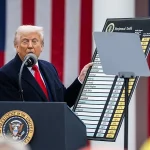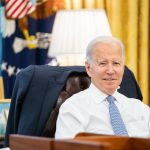China has decided to raise its tariffs on U.S. imports sharply, jumping from a hefty 34 percent to a whopping 84 percent, and this announcement conveniently came on the heels of President Trump’s own tariffs taking effect. It seems the Chinese Communist Party has a knack for dramatic timing, but doing so is about as wise as trying to challenge a grizzly bear with a sharp stick.
In a rather bold move, China’s Ministry of Commerce flexed its economic muscles, claiming a readiness to counter any escalated trade restrictions imposed by the U.S. They are willing to fight to the bitter end, but one has to ponder what “the end” looks like when the world’s largest economy is on the other side of the negotiating table. One thing is certain, China should at least update its script because this performance is getting old.
Meanwhile, officials in the U.S. seem far from worried. White House Press Secretary Karoline Leavitt quickly pointed out that China’s retaliatory measures show a distinct lack of wisdom. America’s strategy under Trump isn’t about taking punches lying down; it’s about delivering a counterpunch so powerful it leaves opponents gasping for air. A bold 104 percent tariff on Chinese goods was proposed as the solution, proving once again that the principles of economics follow the rules of boxing: if you don’t want a black eye, you better know how to throw an effective punch.
Bessent Had the Perfect Response to China Raising Tariffs on US Goods https://t.co/JC4NoYZqKj
— Deenie (@deenie7940) April 9, 2025
Treasury Secretary Scott Bessent added to the chorus, labeling China’s response an outright self-inflicted wound. His message was crystal clear: raise tariffs all you want, but the U.S. isn’t losing sleep over it. It’s like a heavyweight boxer with a big old grin before the match, confident that no amount of chin music from China can break America’s economic spirit.
Some proponents, including Shark Tank’s Kevin O’Leary, argue that the stakes need to be raised even further, suggesting an eye-popping 400 percent tariff should be implemented. O’Leary’s frustration echoes what many Americans feel about the behavior of the Chinese government in international markets. As he put it, China’s track record in the World Trade Organization feels less like a partnership and more like a game of three-card monte. The U.S. needs to take a strong stand, and some believe that fundamental changes to policies are long overdue.
Ultimately, this entire situation serves as a reminder that when dealing with a regime that sees intellectual property theft as a competitive edge, tough talk and even tougher measures are not just recommended; they are necessary. The economic powerhouse that is America has the might to turn the tables, and if China’s decision is to raise their tariffs, then U.S. actions should match that intensity. It’s a classic case of principles versus practices—one stands firm, while the other might just crumble under pressure. If only those on the other side of the negotiations understood that in the world of trade, America plays to win.




